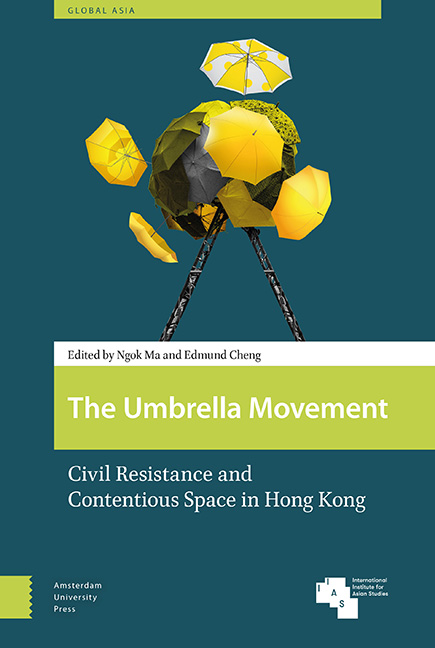Book contents
- Frontmatter
- Contents
- Acknowledgements
- Introduction: Civil Resistance and Contentious Space in Hong Kong
- Part A Trajectory and Contingency
- Part B Repertories and Strategies
- Part C Regime and Public Responses
- Part D Comparative Perspectives
- Appendix: The Umbrella Movement—Chronology of Major Events
- Index
- Publications/Global Asia
10 - Correlates of Public Attitudes toward the Umbrella Movement
Published online by Cambridge University Press: 21 November 2020
- Frontmatter
- Contents
- Acknowledgements
- Introduction: Civil Resistance and Contentious Space in Hong Kong
- Part A Trajectory and Contingency
- Part B Repertories and Strategies
- Part C Regime and Public Responses
- Part D Comparative Perspectives
- Appendix: The Umbrella Movement—Chronology of Major Events
- Index
- Publications/Global Asia
Summary
Abstract
From the start, the Umbrella Movement failed to win overwhelming public support. Why would many Hong Kong people not endorse a civil disobedience movement aimed at dismantling the exclusionary political order and bringing forth democracy? Based on an original public opinion survey collected during the movement, this article provides preliminary answers to these questions. I find that those who disapproved of the movement are no less politically informed. Instead, three factors were strong predictors of disapproval of the movement: (1) satisfaction with the performance of the chief executive; (2) distrust of democracy as a solution to Hong Kong's problems; and (3) concern about the negative impact of the protest on the rule of law.
Keywords: political attitudes, democratization, rule of law, public opinion survey
Introduction
In authoritarian regimes, protesting is risky. Individual protesters are likely to face dire consequences such as police brutality, unfair trials, imprisonment, torture, or even death. Occasionally, however, an anti-regime protest will achieve a high turnout, which helps to reduce the personal risk of participation. For example, drawing on the experience of the “colored revolutions” in some former Soviet Union countries, Thompson and Kuntz (2004) and Tucker (2007) point out that blatant electoral fraud facilitates protests against authoritarian regimes by providing a focal point for mass mobilization. Because “stolen elections” create a widespread discontent in society, citizens know that the protest turnout would be huge. As a result, the risk that individual protesters will be singled out by the repressive apparatus becomes small.
It is important to note that even for anti-regime protests with huge turnout, such as those of the “colored revolutions,” the number of protesters is always a tiny fraction of the population. This is not surprising because ordinary citizens tend to be risk-averse. However disgruntled, they may not tolerate even a modicum of the risk associated with state repression. In addition, people need to work, attend school, hang out with friends, or take care of children. The chance that any individual protester will be able to have a decisive influence on the protest outcome is vanishingly small. For these reasons, rational individuals should not participate in a protest, however low the probability of state repression is.
- Type
- Chapter
- Information
- Umbrella MovementCivil Resistance and Contentious Space in Hong Kong, pp. 251 - 276Publisher: Amsterdam University PressPrint publication year: 2019



